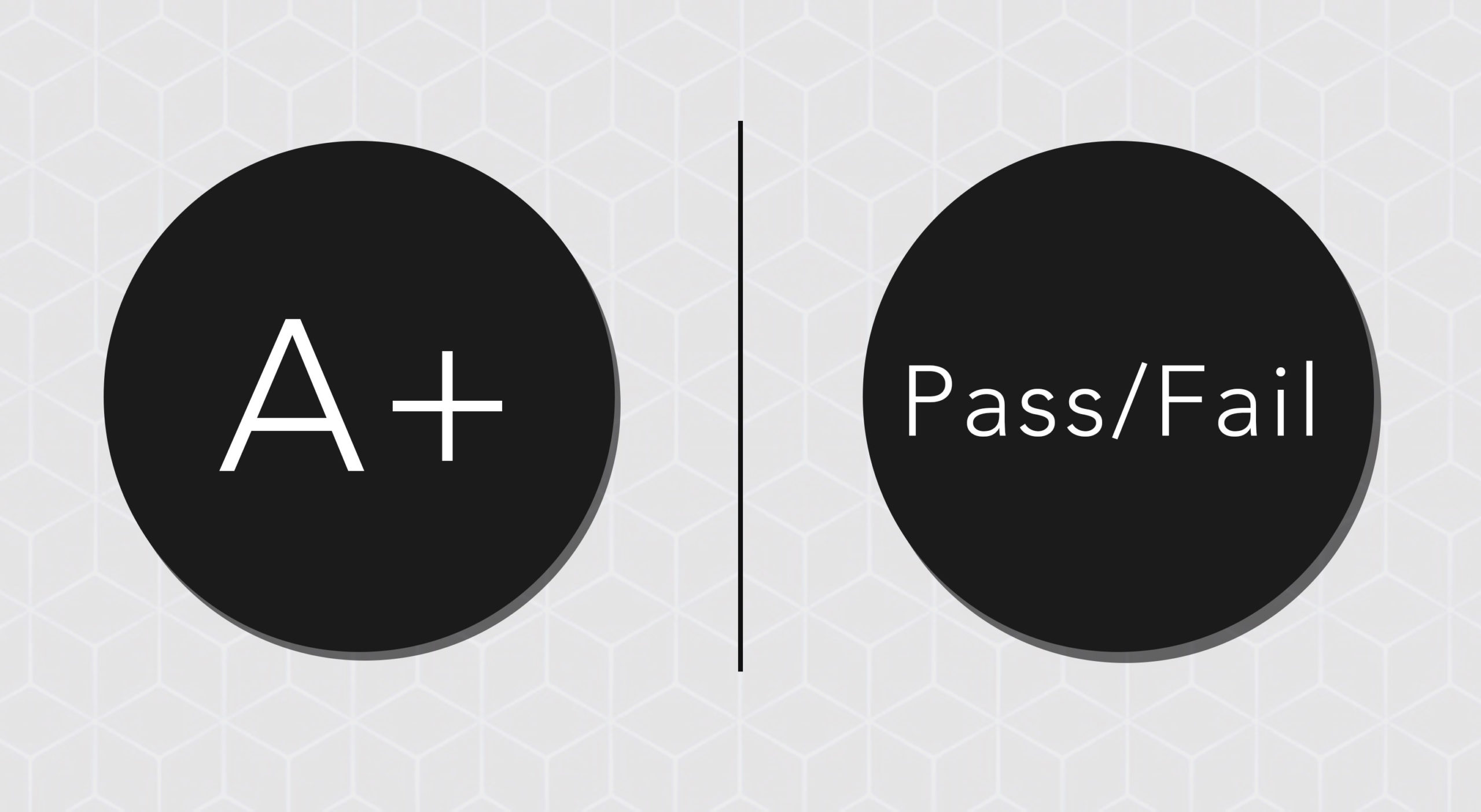Point-Counterpoint: Is pass or fail grading a good option?
In the winter 2020 semester, students had the option of seeing satisfactory or unsatisfactory rather than letter grades on their transcripts because of the abrupt move to remote learning in March due to the onset of the COVID-19 pandemic.
With the fall 2020 semester taking place online, transitioning courses to an online format has not been easy and many students have had difficulties adjusting.
To combat such difficulties, should a pass or fail grading system be implemented once again?
Point: Grades aren’t what they seem
Grades may be a simultaneous source of dread and motivation, but are they worth the trouble? Imagine a system without grades, without needless worry over percentages, without false worth imposed on your personal learning process. The pass or fail system is the solution to these problems. It’s already being implemented in schools across the country, including our own.
Pass/Fail systems eliminate the false incentive to learn created by grades
While it may feel nice to get that 100 per cent (or even anything above a 60 per cent) on a test, quiz or exam, grades often miss the point of why we learn in the first place. Learning isn’t about a score or a letter, it’s about the growth of the individual mind, fostering curiosity about new things, deepening understanding of one thing, and becoming a more whole, complete human being. Grades reduce this grand project to a number, often leading one to believe their learning is nothing but a statistic. Think of what a grade really means. Does getting a 75 per cent mean you only learned three-quarters of the subject matter of a given class? Not really.
Learning is complex. Grades reduce learning to a number, which often has worse effects than it seems. This problem is exposed early on in most classes. What is the first question students ask about a given lecture?
Usually, “is this going to be on the exam? or “how much is this worth?” or “is this graded?” come up.
It’s normal, considering our current state of affairs, to be curious about grades. But this concern has gotten out of hand. It has successfully taken over the idea of learning. School has become a scheme of memorization and repetition. What’s left is a sad, sorry statistic showing your effort, understanding, or something in between? What exactly does a grade mean? This isn’t the place to go into it, but there’s something rather ambiguous about that number or a letter’s supposed representation of your mind’s work.
Pass or fail systems reduce stress and anxiety
With this new system, learning is not about the number or letter someone gives you at the end of the semester, it’s about taking things day by day and doing your best. Taking away the pressure of a number bracket helps students focus on what’s important (which might not be school, and that’s okay).
Allowing students to try their best is probably the best a school system can do right now. Pass or fail could even help some put things in perspective, showing students that the difference between a 75 per cent and an 80 per cent on that essay they hated writing isn’t as big of a deal as it seemed. What’s the point in worrying about that discrepancy when you haven’t showered in two days or eaten a proper meal? Take care of yourself and school comes naturally.
If you enjoy what you’re learning, you feel good in your body and mind, school will doubtless be much easier.
Pass or fail systems are needed during a pandemic, especially with online learning
It’s become clear that, aside from everything else, students do not have equal opportunities to learn from home. Everyone faces a unique situation, probably unexpected, with demands and challenges wholly specific to a factor of things.
Whether it’s stress or anxiety, inconsiderate roommates or family, needing to care for others, the list goes on. Implementing a pass or fail system allows students to take care of themselves (and maybe others, too) without sacrificing their academic requirements.
It does not harm students’ transcripts when all schools do it
A curious concern a number of people seem to have is how, if a pass or fail system is implemented, students will be deemed capable by others after school.
This concern, while potentially valid in highly specialized fields, does not matter as much as it seems, especially given our current circumstances. It’s likely future employers will all have experienced the year 2020, so don’t get your transcripts in a twist thinking your fate lies in the hand of a measly grade.
Grades are probably more subjective than we’d all like to believe
As nice as it would be if grading were a perfect system, it isn’t. Unless you’re taking a multiple choice exam, this becomes clear incredibly quickly. Why did you get a 73 per cent instead of a 76 per cent? Look, your professor miscalculated your final score, you actually earned an 80 per cent. Upon pressing further, your teaching assistant concedes to have your grade evaluated by your professor, and you do even worse than before. Academic life is littered with such examples. They all point to the blurry nature of grading, which a pass or fail system would eliminate.
Most of the time, another human being calls the shots in determining where you stand on the academic ladder. Human beings are imperfect creatures. Believe it or not, but your grades are subject to all kinds of scrutiny typically considered irrelevant to your learning. Was your paper graded first or last in the long pile? What time of day was your assignment graded? Does your professor know you personally? Do they like you? Do you participate in class?
All of these factors play a part in that final number on your transcript, but they have nothing to do with the actual assignment you wrote. Pass or fail systems make this problem far simpler. With only two options, no one can deeply affect your academic future unless you do something incredibly wrong.
-Cameron Lamoureux
Counter point: Against pass or fail grading for the winter 2020 Semester
A petition advocating for the University of Ottawa to bring back the pass or fail grading that was instituted at the end of the winter 2020 semester to help students adjust to the hasty switch to online classes due to COVID-19, has been signed by over 5,000 University of Ottawa students.
With two semesters of online school behind us, and an unknown number of virtual semesters ahead, the wish to allow pass or fail grading is unwise and could hurt rather than help.
One of the most important skills that a student should have, or learn throughout their education, is adaptability. There should be a reasonable expectation placed upon students to adapt to the problems and changes faced, after a certain period of time, and excluding extreme circumstances or special situations, which should be treated on a case by case basis. Starting from the middle of the winter 2020 semester, the spring and summer 2020 semester, and then this fall 2020 semester, many students have been through up to almost three whole semesters of virtual education. In both this current semester and the summer semester, students were not given a pass or fail option.
It should be questioned why students and the University of Ottawa Students’ Union (UOSU) did not immediately demand that the accommodations for the winter 2020 semester be continued into the fall. Here, it could more reasonably be argued that students had not had time to adapt to online classes and COVID-19.
At the moment, no one is sure how long virtual education will last, so it could extend through the fall 2021 semester. If the current pandemic situation persists until then, will there ever be a cutoff point for when students (and professors!) treat online classes as seriously as in-person classes?
Reinstating a pass or fail grading system makes it easier to reinforce the common view that online school is not serious. This is already a damaging view for students, with the media and some professors perpetuating the idea that students do not place weight on virtual classes, and cheat or obtain higher marks more easily, when this is generally not the case. A pass or fail option offers the opportunity to attack students for covering up their grades and letting the pandemic take complete ownership of the results of their actions.
When considering the impact of a pass or fail grading system for students academically, no one can be sure how the grades obtained through the pandemic during virtual classes will be seen, either after COVID-19 or graduation. A pass or fail option for students could likely worsen this, as transcripts do not show class averages, which are often important, or even class size. Consider two students who obtain the same low but passing grade in a course, with only one student picking the pass option, and the other opting to keep their letter grade. The difficulties that this would pose in evaluating and comparing transcripts, especially for admission to higher education, are troubling.
Finally, it especially does not seem that the fail option is hugely rewarding, as failing a course will generally not be looked upon much more generously (in normal circumstances where the class average is a passing one) whether a student has obtained a 48, a 20, or just a fail.
While there is no denying that the circumstances that students are living through are stressful, confusing, and new, and that professors should be trying much harder to adjust and accommodate them, students should also consider the way they want themselves and their degrees to be perceived on the other side of this pandemic.
Cases should be evaluated individually, but for the majority, a pass or fail grading system should not be reinstated, as it lowers students’ adaptational abilities and cheapens many aspects of their performances and grades.
-Engi Abou-El-Kheir





